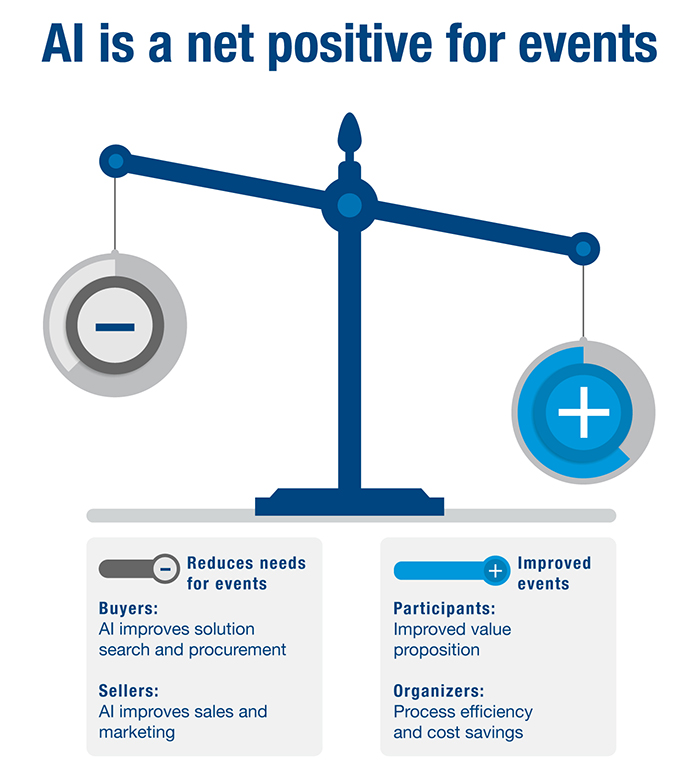There is no shortage of hype around AI with the recent CEO-related drama at OpenAI and various “prophecies of doom.” We know there will be big impacts on business, ranging from the reshaping of law firms to pressure on Google paid search. But what does it mean for business events?
There are risks associated with event participants utilizing AI, as it may diminish their reliance on events. For example, AI can improve solution search and procurement for buyers while improving sales and marketing for sellers. Overall, there is a net positive for events with significant prizes for organizers who use a variety of AI tools.
The prizes fall into two domains: The first is enhanced value proposition for participants, and the second involves advantages around process efficiency and consequent cost savings for event organizers.
Improved Value Proposition
The random meeting model and serendipity will remain integral to events, but successful organizers will excel in enhancing personal relevance through personalized experiences.
Enhanced and targeted communication will bring new levels of personalization to event marketing. With micro-segmentation, organizers can send highly personalized emails to prospects, drawing insights from their company’s website and online activity.
Using AI for matchmaking is not new, with players such as Grip founding their businesses on this technology. Other organizers, such as Hyve and Ascential offer 1-to-1 at the core of their events. However, the effectiveness of such approaches varies across different event formats, with attempts to retrofit 1-to-1 interactions into traditional trade shows yielding mixed results.

Authenticity
The growth of AI may bring an unexpected benefit for events, namely, heightened authenticity. It is becoming harder to distinguish what is real and what is not. Continuing this trend of “blurring,” we are seeing these artificial elements coming to audio, and it is starting on video, as well. In-person settings undeniably deliver this authenticity.
Richer Engagement and Deeper Content
Generating more targeted invitations to meetings and conference sessions should lead to more focused audiences and richer engagement. However, automation, coupled with personalization, results in a higher bar to get attention. Conferences and other content can also be improved using AI to support content generation and dissemination. With strong execution, attendee return on time will increase alongside sponsor and exhibitor ROI.
Organizer Benefits – Customer Understanding
One of the pillars of Exhibitions 3.0 is customer centricity. Customer understanding allows teams to define an event brand’s North Star and build its strategy. AI can support this by bringing new ways to analyze participant data and enhance customer understanding by facilitating improved feedback and analysis. In addition to automating translation and sentiment analysis of survey results, sentiment can be monitored passively.
Process Efficiency and Cost Saving
The AI Index shows that the leading use case of AI, by far, is cost reduction (cited by 37% of respondents in its annual survey). Like many other businesses, event organizers can automate tasks across the back office, as well as aspects of customer service. AI will not just help bots answer customer questions, it will route conversations to the right team, speed up teammate response times, create help center content and enable teams to understand trends in their conversations.
Predicting participant likelihood to attend, buy or churn is already a compelling use case of analytics for organizers. We should look out for potential improvements to AI’s pattern spotting capability as well as other ways to optimize marketing spend. Sales functions can be enhanced with improved targeting, lead scoring and scripting.
Conclusion
As the events industry continues to evolve, AI emerges as a pivotal tool for enhancing participant experiences and benefiting organizers. Tech-forward and process-led organizers stand to gain the most from integrating AI solutions into their event strategies, ensuring continued relevance and success in an increasingly competitive landscape.
Editor’s note: Carole Boletti, Associate Director at Stax, contributed to this article.
Don’t miss any event-related news: Sign up for our weekly e-newsletter HERE, listen to our latest podcast HERE and engage with us on LinkedIn!



